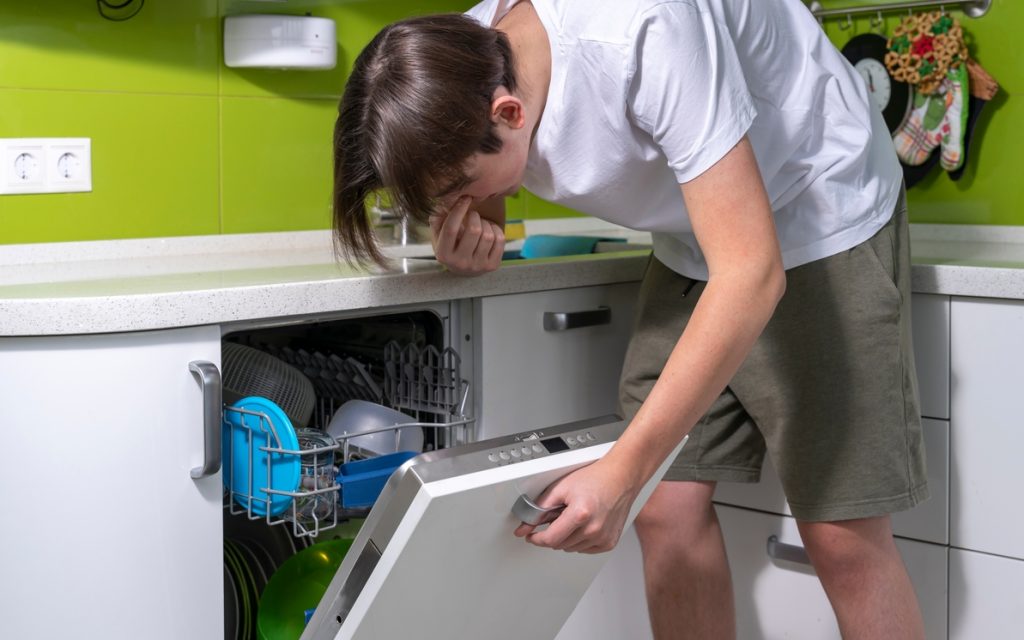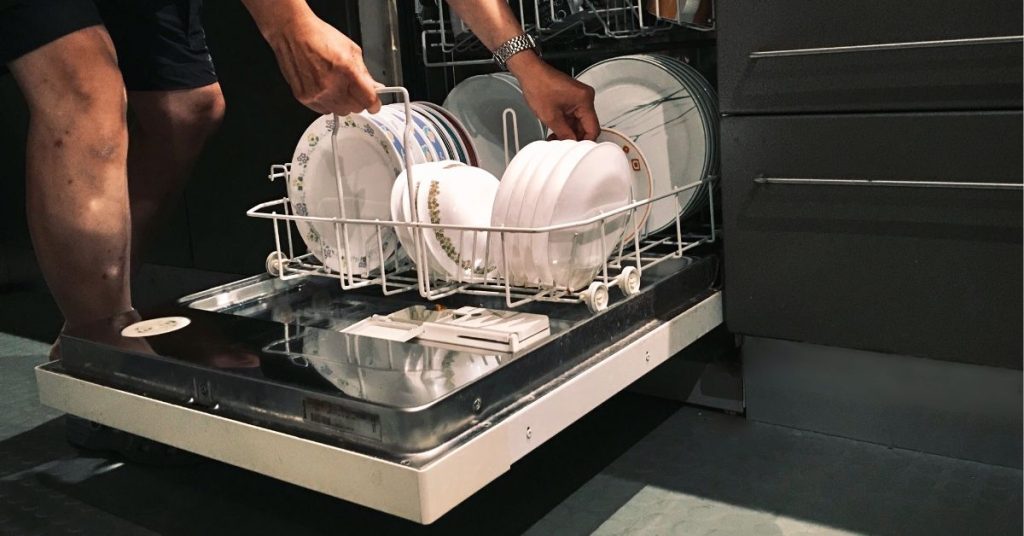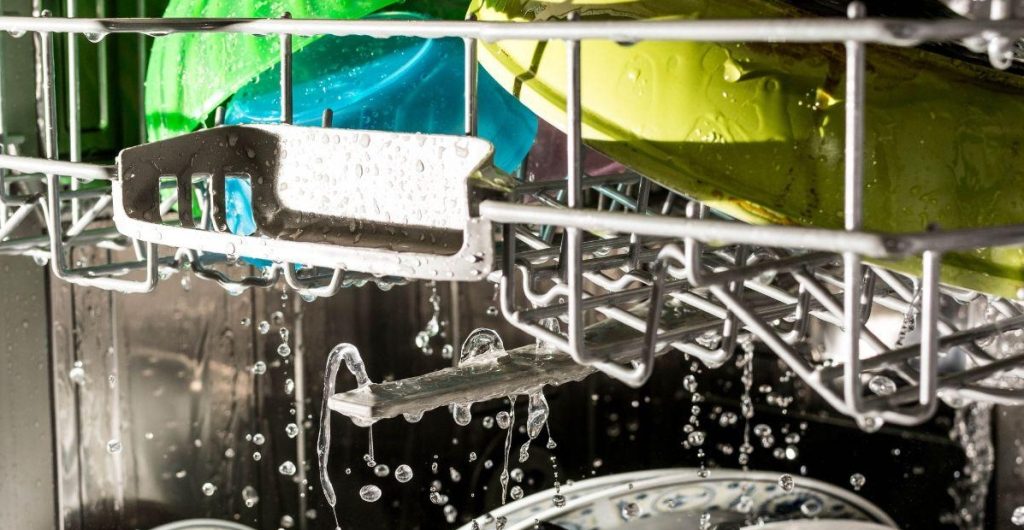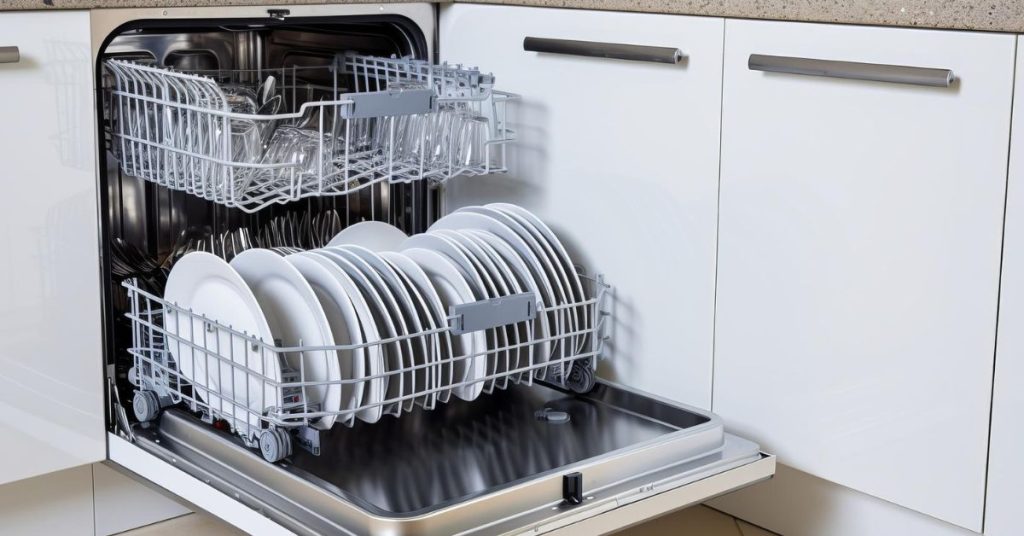Dishwashers are a time-efficient and convenient appliance, but they can also be a source of unpleasant odors. If not properly maintained, foul smells from a dishwasher can make eat-in kitchens an unsavory place. Whether it’s food clogged in the drain, unwashed dishes piling up, or stagnant water, there are many reasons why a dishwasher may smell worse than normal. To keep your kitchen smelling fresh, cleaning experts say to watch out for these three main sources of dishwashing stenches. There are several reasons why a dishwasher might develop a smell over time. One of the most common is a buildup of food particles and debris in the dishwasher’s filter and spray arms. If you don’t use your dishwasher regularly and allow plates and dishes to slowly pile up over time, the smell is likely from the food degrading inside the dishwasher before running the cycle.
Alicia Sokolowski, President of AspenClean, says that food debris is the main cause of foul dishwasher smells. She explains, “when food particles are left behind in the dishwasher after a cycle, they can start to rot and cause a foul odor.” If you’re running a full cycle and the machine still smells, food is getting trapped somewhere. You can prevent these smells by ensuring dishes are pre-rinsed before they run through a cleaning cycle. And after every cycle, run the empty dishwasher through a self-cleaning cycle with hot water and fresh lemon.Why Does My Dishwasher Smell? 3 Causes of Stinky Odors
To suss out the potential cause of your dishwasher odor, pay attention to what it smells like. If your dishwasher smells like fish or rotten food, you may have a clogged dishwasher drain or a dirty filter. A sewage or wet dog smell can point to a drainage problem that may need professional inspection. Read more about the possible causes and the steps you can take to help get rid of the odor in your dishwasher. The most common cause of dishwasher odor is a dirty filter. Food particles can get trapped in your dishwasher’s filter, and without regular cleaning, your filter can start smelling foul. Just like your shower, your dishwasher can build up a layer of soap scum over time. Soap scum acts like a glue trap for food particles, and without regular cleaning, this buildup can make your dishwasher smell bad. The particles cling together with the soap scum instead of rinsing down the drain, which may cause a foul odor in your appliance.
Thankfully, you can clean the interior of your dishwasher in a single cleaning cycle with a dishwasher cleaner like affresh® Dishwasher Cleaner tablets or distilled white vinegar. The acidity of white vinegar is an excellent neutralizer for dishwasher odors. You can also use white vinegar to clean glasses that have gotten cloudy from your dishwasher. Add a dishwasher cleaner tablet to the detergent dispenser, then run a Normal wash cycle without dishes. Alternatively, pour two cups of white vinegar in a dishwasher-safe bowl and place it on the bottom rack of your empty dishwasher.
Most dishwashers have a heating element that is used to heat up water and to speed up moisture removal from your dishes and your appliance’s interior. If you notice a burning plastic smell coming from your dishwasher while it is in use, it could be the case that plastic has come into contact with the heating element. This can happen when a loose food container lid or a piece of plastic silverware falls through the rack and onto the heater during the drying process. When you notice the smell of burning plastic, stop the cycle and wait for the heating element to cool off, then remove the plastic object. Be sure to only wash dishwasher-safe plastic items in the dishwasher and to place these objects on the top rack. When loading your dishwasher, make sure each item is securely in place to help avoid dishes becoming loose. With all of the moisture and heat that your dishwasher produces, it is possible for mold and mildew to take up residence without regular cleaning.
A common area for mold to grow is inside the lips of the gasket seal. If your dishwasher smells bad, be sure to inspect the seals of the door. Use a clean sponge and warm, soapy water to clean the buildup on the gasket seals. Then, wipe the gasket seals dry with a clean rag. Regular cleaning and maintenance are crucial for helping to eliminate odors in your dishwasher. Follow these steps to help keep your dishwasher smelling fresh. Remember to refill your Rinse Aid dispenser routinely after these steps to help enhance your dishwasher’s performance. Be sure to empty your dishwasher of dishes, glassware and utensils before cleaning. This will give you easier access to your dishwasher’s interior. Next, pull out the bottom rack and remove your dishwasher’s filter.
Beyond the Basics: Other Causes and Considerations
If you get a sewer smell when you are using the dishwasher on a kitchen sink, it often means that the dishwasher filters needs to be cleaned or there is a blockage in the vent or the drain of the pipes inside the wall. Bad odors within dishwashers is a common occurrence and can develop overtime through regular use. It is usually caused due to buildup of food particles in the dishwashers filter, in it’s vents or in the drain pipe. Checking these three areas will narrow down where the bad smell is coming from. Typically, the filter is the place to check first and as dishwasher filters are easy to remove. Checking vents and drain pipes require a bit more knowledge and best inspected by a professional. Most dishwashers have a drain filter which prevents food particles from reaching the drain pipe and resulting in a blockage. Food particles can begin to buildup in the filter, and over time, begin to emit a bad odor.
If you have a clogged vent on the roof, then the back-pressure that is created when you try to put water into the pipe, will slow the water down and it will begin to clog the pipe. In order for water to enter a pipe, it has to have an open vent on the roof of the house. This is a pipe that is attached to the drains, but instead of running down to the city, runs up to the roof. Since both water and air take up volume in the pipe, in order to put the water into the pipe, you have to push the air aside. The vent redirects the pressure up to the roof at the same speed the water is flowing. So if either the drain or the vent are clogged, then there is no place for the water to go without first forcing the air back into the room, which is combined with sewer gas. This is another culprit for bad dishwasher smells and is best handled by a professional plumber.
If you’ve cleaned the filter and your still having bad dishwasher smells then you may have an issue with your vent or drain pipe.
Bad smells can also relate to a problem with the drain hose. If the hose is kinked or bent, it can prevent water and solids from draining properly. Food particles can get trapped in the drain hose and start rotting and smelling bad. The drain hose may also be sagging or not properly placed, and this can trap food inside. Ideally, the drain hose should run downhill from the dishwasher to the drainpipe. If the hose runs along the floor and then back up to the drainpipe, the wastewater will have to run uphill and fight against gravity. As a result, food particles can get stuck down in the hose and lead to bad odors. At Hope Plumbing, our team can help you quickly overcome bad odors or other plumbing issues. We offer a full range of residential plumbing, drain cleaning, and sewer services, and we also install and repair almost all plumbing appliances.
Dishwashers are extremely convenient, but there may be times when you open your dishwasher only to be hit with a funky odor. Noticing a bad smell coming from your dishwasher can be disconcerting and may make you wonder whether it is actually getting your dishes clean. There are also times when the dishwasher may start to make your dishes stink, too, which can be even more worrisome. If you are having issues with bad odors coming from your dishwasher, here are the most common causes and some simple steps you can take to both overcome the smell and prevent future bad odors.
If you notice a moldy or musty odor near your dishwasher even when it isn’t running, it usually means that the appliance has a leak. A major leak is something you will notice fairly quickly, as you will typically see water pooling up on the floor in front of the unit whenever it runs. A major leak can also cause the floor around the unit to warp or start to feel spongy. Smaller leaks are often much harder to spot, and you often won’t know the unit is leaking until you start to smell mold and mildew. If even a tiny trickle of water is leaking, mold and mildew can quickly start growing under the dishwasher. If you suspect your dishwasher is leaking, it’s wise to inspect it before you run it again. You might be able to check for leaks by unhooking the water and drain lines and pulling the appliance out, but this can be difficult and may be something you’d rather let a professional do.
After emptying the dishwasher, place a large bowl full of vinegar on the bottom rack. Turn the unit on for a full cleaning cycle and then let it air dry. You don’t want to add soap when cleaning as this will prevent the vinegar from working properly. This method can also be used to keep your dishwasher smelling fresh. Doing this even once a month can be a huge help in preventing odors. The gasket seal runs around the entire inside of the door and works to prevent water from leaking out. If you notice a moldy odor every time you open your dishwasher after it completes a wash cycle, it usually indicates that mold is growing on the gasket seal. This is one of the easiest problems to fix, as all you need to do is use a soapy sponge or disinfecting kitchen wipe to fully wash and clean the seal. We recommend doing this every month or two to help prevent odors.
Supplementary Information: Hard Water, Garbage Disposals, and More
Hard Water Buildup: Mineral deposits from hard water can accumulate in your dishwasher, leading to reduced efficiency and a musty smell. Using a water softener or adding dishwasher salt can help combat this problem. To get rid of the smell in your GE washer, follow these simple steps: Empty the dishwasher: Remove all dishes and utensils from the appliance before cleaning. Locate the filter: Find the GE dishwasher filter location by checking the bottom of the dishwasher. The filter typically consists of a coarse filter, a fine filter, and a filter cover. Clean the filter: Remove the filter components and clean them thoroughly with warm, soapy water.
By adhering to the steps outlined in this guide, you will be well-prepared to address the issue of unpleasant odors in your GE washer. Engaging in regular maintenance, thoroughly cleaning the filter, and utilizing natural cleaning agents such as vinegar and baking soda can significantly reduce the chances of your GE dishwasher smells reoccurring. As you incorporate these practices into your routine, you can look forward to enjoying a consistently fresh, clean-smelling dishwasher that efficiently delivers gleaming, spotless dishes for you and your family. And if you have any issues with your dishwasher, remember our top-rated dishwasher service technicians are just a call away!
If you have a garbage disposal hooked up to your dishwasher, you may need to clean your garbage disposal by using at-home remedies or buying garbage disposal cleaning solutions. Another reason your dishwasher smells bad could be because the dishwasher air gap hose connection, which connects your sink to your garbage disposal, needs to be rinsed out. Your dishwasher air gap hose is commonly found next to your sink’s tap and runs to the dishwasher.
Emptying the dishwasher and finding dishes with a foul (often described as “fishy”) odor isn’t all that uncommon. If you’ve never had the problem before, the logical reaction is to blame it on whatever automatic dishwashing product you’re using. More often than not, though, “stinky” dishes are the by-product of a dirty dishwasher, or “hard” water. Over time, small particles of leftover food accumulate in the filter or crevices of the machine and begin to smell. The dishwasher can transmit the odor to dishes during the drying cycle. Unless the machine is cleaned out periodically, the smell will persist. Remove the filter from the dishwasher and clean it thoroughly, using a stiff scrub brush, soap and hot water. Instructions on how to remove the dishwasher filter vary by make and model, so check the manual for your dishwasher to make sure you’re removing and replacing the filter correctly.
If the inside of the dishwasher still smells fishy after you’ve cleaned the filter, it’s time to clean the machine. Make a simple paste of baking soda, dish soap and water and use this mixture to scrub the interior of the dishwasher, including gaskets, shelves and walls. Rinse the mixture out of the dishwasher by running an empty cycle at the hottest temperature available. Rinse dishes before putting them in the dishwasher, or at least scrape off any large pieces of food so they won’t clog the dishwasher’s drainage system. Periodically clean the filter and the inside of the machine to keep food build up from causing odors in the future. Food debris has a better chance of becoming trapped in gaps of the machine when too little water is used during the wash cycle. Avoid using the kitchen faucet when the machine is filling with water so as not to divert water resources from the washing machine as it fills.
Combine a good cleaning with some pro-active prevention and you should be able to banish dishwasher smells for good! We hope these tips won’t have you continuing to ask “why does my dishwasher smell?”
FAQ
Q: Why does my dishwasher smell like rotten eggs?
Having an eggy smell coming from your dishwasher is not only unappetizing when using your clean dishes, but it can also feel like an overwhelming feat to get under control. But do not worry; your dishwasher may require simple routine cleaning or maintenance, because contrary to popular belief, a dishwasher requires occasional cleaning. A potential reason for the funky smell that is coming from your dishwasher is that it simply needs a good cleaning. Food particles that fall off your dishes may get stuck in your dishwasher and cause food decay. Some water at the bottom of your dishwasher is not bad. It can help keep seals around the drain from drying up. But more than an inch of standing water can cause alarm, as it could be why your dishwasher smells like eggs. Due to a clog found in the draining system, wastewater can back up and make your dishwasher smell unpleasant.
Q: How often should I clean my dishwasher to prevent smells?
Regular cleaning is the best offense against a stinky dishwasher. Using these straightforward cleaning procedures, you can clean the bad smell out of a dishwasher. Remove the drain filter from the bottom of the dishwasher. Clear out any trash and food waste from the filter. Make a mixture of hot water and dishwashing liquid. Soak the drain filter in the mixture and use a soft-bristled brush to scrub it gently. Rinse with clean water and replace the drain filter. Remove the upper and lower spray arms. Clear the passages of stray food particles using a toothpick or scour brush. Next, clear all the holes in the spray arm by running hot water through them.
Q: Can I use bleach to clean my dishwasher?
Everyday odor neutralizers include items like white vinegar and bleach. First, pour one cup of white vinegar into a dishwasher-safe bowl to use an odor neutralizer on your dishwasher. Another deodorizer method that works well includes the use of baking soda. Sprinkle baking soda all over the bottom of the dishwasher and leave it overnight. Running an empty cleaning cycle in the morning to wash it away will provide a natural odor neutralizer. It is best to identify where it is coming from to get rid of that bad smell in the dishwasher.
Q: What if the smell persists after cleaning?
If you’ve run through the list of dishwasher deodorizing tips and still can’t get rid of the funky smell, you should call in a plumber or appliance expert for help. Some instances, such as a drain line that is deeply clogged, call for professional tools. It’s also possible that the dishwasher itself isn’t to blame, but could instead be masking another problem, such as mold along the wall or cabinets around the dishwasher.







